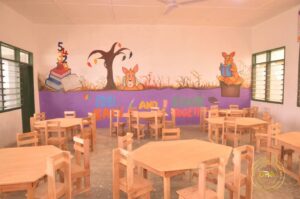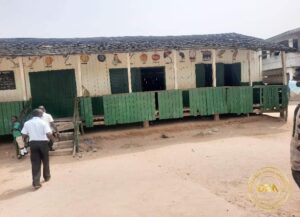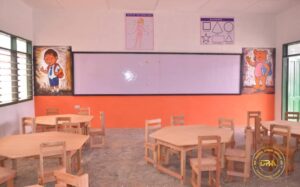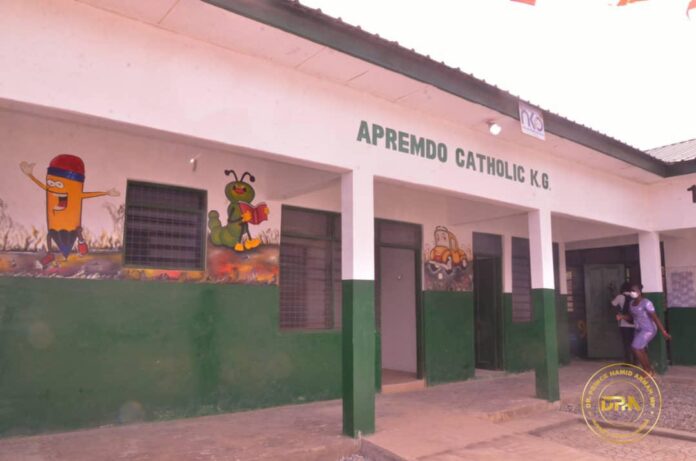The Member of Parliament for Kwesimintsim and Deputy Minister for Works and Housing, Dr. Prince Hamid Armah has commissioned an ultra-modern Kindergarten (KG) classroom block in Apremdo.
The event, held on 16th September 2024, marks a significant milestone in the New Kwesimintsim Dream (NKD) and showcases the HEAL Kwesimintsim Programme’s commitment to enhancing educational infrastructure in the constituency.

The project, which was fully funded by the Ghana Education Trust Fund (GETFund), reflects a successful partnership between government resources and local initiatives to improve educational facilities.
The newly commissioned KG block features modern classrooms, interactive learning tools, a playground, and proper sanitation facilities designed to create a safe and conducive environment for young learners.
The Deplorable State of the Old KG Facility
Prior to the commissioning of the new facility, the old KG in Apremdo was in a highly deplorable state, posing significant risks to the safety and well-being of the children.

The previous structure was a dilapidated wooden building with broken panels, loose planks, and large gaps in the flooring. Parts of the floor were missing, creating hazardous gaps that endangered the children daily.
The exterior of the old building was characterized by peeling paint, rotting wood, and an unstable foundation, making it a dangerous environment for young learners. The lack of basic amenities, such as proper ventilation and sanitation, further exacerbated the unsafe conditions, turning the facility into a health and safety hazard rather than a place for learning and development.
This dire situation had long been a source of concern for parents, teachers, and community members, who consistently called for urgent intervention to provide a safer and more conducive learning environment for the children of Apremdo.
Significance of the New Ultra-Modern KG Block
In his speech, Dr. Armah highlighted the transformative impact of the new KG block on the community. He emphasized that the new facility is not just a building but an investment in the future of Apremdo’s youngest residents, providing them with a safe, modern, and inspiring environment that meets current educational standards.

“The commissioning of this ultra-modern KG classroom block, made possible through the generous funding from GETFund, is a testament to our unwavering commitment to the future of our children. It reflects our dedication to providing quality learning environments where children can thrive,” Dr. Armah stated. “Through the HEAL Programme, we are focused on Education & Training, ensuring that the New Kwesimintsim Dream becomes a reality by investing in the early stages of our children’s education.”
Parents, educators, and community leaders expressed their gratitude for the new facility. “We are deeply thankful to GETFund and Dr. Armah for prioritizing our children’s education. The new KG block is a game-changer for Apremdo, providing a safe and modern environment for our children to learn and grow,” said Madam Rebecca Yalley, a parent and resident of Apremdo.
Continuing the Vision for Kwesimintsim
The commissioning of the KG classroom block is part of Dr. Armah’s ongoing efforts to improve educational infrastructure across Kwesimintsim. This initiative follows the completion of several other educational projects aimed at enhancing learning conditions and reducing overcrowding in schools.
Dr. Armah reaffirmed his commitment to the continued development of Kwesimintsim, emphasizing that the HEAL Programme will continue to drive progress in Health, and infrastructure, Education and Training, Agric, Entrepreneurship and Jobs, Leadership and Governance.
He acknowledged that such projects would not be possible without the crucial funding and support from GETFund, which plays a vital role in transforming educational facilities across the country.
As the community of Apremdo celebrates this new addition, the ultra-modern KG classroom block stands as a beacon of hope and progress, demonstrating what can be achieved when local leadership and national funding bodies work together to meet the needs of the people.

